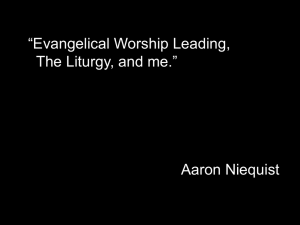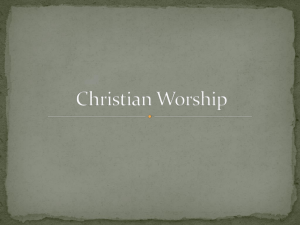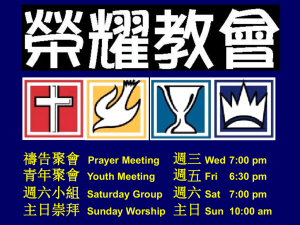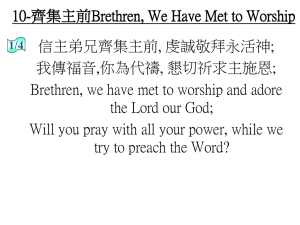The Daily Act of Worship
advertisement
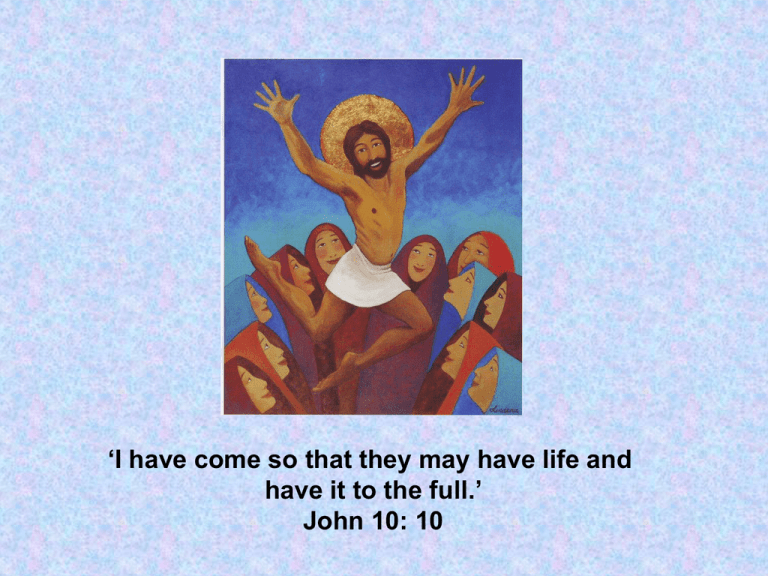
‘I have come so that they may have life and have it to the full.’ John 10: 10 Prayer and worship is our loving response, in word and action, to God’s invitation to enter into relationship with Him, made possible through the work of Jesus Christ and the witness of the Holy Spirit. It is concerned with giving glory, honour, praise and thanks to God. The Daily Act of Worship: The legal requirement (Section 70 of the 1998 Education Act) is that ‘subject to the parental right of exclusion or other special arrangement each pupil in attendance at a community, foundation or voluntary school shall on each school day take part in an act of collective worship.’ The Aims (1) The daily act of worship aims to provide opportunity for all pupils and staff: •To contemplate something of the mystery of God and to give honour, praise and thanks to Him •To reflect on spiritual and moral issues •To explore their own beliefs •To respond to and celebrate life •To experience a sense of belonging and develop community spirit •To develop a common ethos and shared values The Aims (2) • To develop the skills of: Reverence Contemplation Reflection Interpretation Empathy Meditation • To enrich religious experience • To grow in liturgical understanding • To reinforce prayers which are part of the Catholic tradition • To reinforce positive attitudes • To develop a sense of awe, wonder and inspiration in the person of Christ Principles • Keep it short • Make it regular • Keep it simple • Provide variety • Get children involved A liturgical structure: Gather – how we come together, the setting, the environment Listen – the Word of God is proclaimed Response – the response to the Word leads into a time of prayerful reflection which may be accompanied by a symbolic action Going Forth – giving the children something to hold on to from the experience of the liturgy that they can take into their daily lives Good practice (1): •Where there is evidence of the planning and evaluation of provision •Where there is a clear theme and message •When opportunity is taken through the choice of themes for the pupils to become familiar with the traditions, customs and practice of the seasons and feasts of the Church and where topics relevant to pupils lives are reflected upon in the context of the Word of God and the teachings of the Church •Where opportunity is given to reflect upon and to develop the values of ‘community activity, exchange of greetings, capacity to listen, to seek and grant pardon, expression of gratitude, experience of symbolic action, a meal of friendship and festive celebration’. (General Catechetical Directory no. 25) Good practice (2): •When a ‘sacred space’ is created through a focal point, music etc. •When Scripture is given prominence •When opportunity is taken to use liturgical responses and actions •When there is evidence of a variety of approaches, telling a story, describing a situation or event, using images, special objects, dance, drama, music etc. Good practice (3): •Where there is opportunity for individual and communal prayer in a variety of forms e.g. spontaneous, litany, intercession, meditation, traditional etc. •Where pupils not only lead acts of worship but are skilled in preparing acts of worship •Where the act of worship follows a liturgical structure, Gathering, Listen, Response, Going Forth •Where it encourages thinking about the needs of others Good practice (4): •Where it affirms relationships and provides the opportunity for the collective sharing of joys and sorrows •Where it helps to promote a common ethos and shared vision •Where there is good use of visual aids, story, scripture etc. •Where there is effective use made of music Good practice (5): •Where silence is used effectively to allow time for thought, prayer and reflection •Language that is used is suitable for the age group •There is a direct link between faith and everyday life •The act of worship is separated from administration •When gathering and leaving is conducted appropriately. Good practice (6): •Where the senses are engaged •When the act of worship encourages thinking about the needs of others •When it affirms relationships and provides opportunity for the collective sharing of joy and sorrow. •When it is a learning experience but the focus is on worship and not on teaching •Where adults are good role models •When practical, that other adults/parents are invited to share (not simply observe) in the time of worship Planning a Daily Act of Worship using a Liturgical Structure Gather Listen Response Going Forth Planning Checklist for a Daily Act of Worship Helping Older Pupils to Plan an Act of Worship Helping Younger Pupils to Plan an Act of Worship Creating resource theme boxes Planning sheet for an Act of Worship Monitoring and evaluating the daily act of worship Useful websites Mission Together: www.missiontogether.org.uk Spirit of the Season: www.liturgyoffice.org.uk/SOS Church House Publishing: www.chpublishing.co.uk/schools CAFOD Resources: www.cafod.org/primary CAFOD Resources: www.cafod.org/secondary Catholic Education Service: www.cesew.org.uk Teacher NET: www.teachernet.gov.uk The Bishops of England and Wales Liturgy office: www.liturgyoffice.org.uk Diocese of Hexham and Newcastle: www.edurcdhn.org.uk Culham Institute: www.culham.ac.uk/cw/assemblies You Tube resource: http://www.youtube.com/watch?v=_vEjt280PDo
